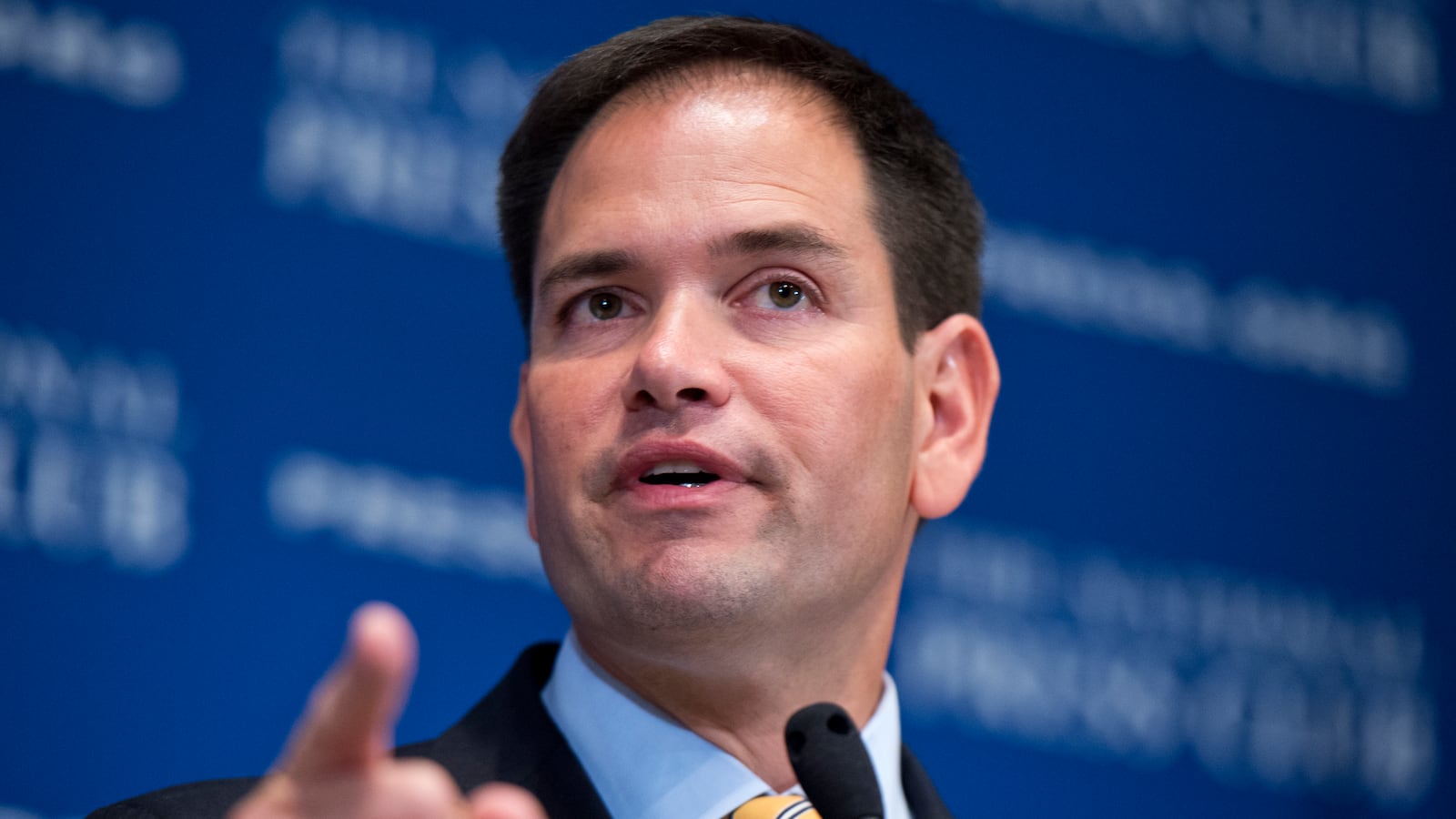Sen. Marco Rubio (R-FL) was supposed to be at the National Press Club to talk about a retirement plan he’s worked out to curb the growth of Social Security and Medicare. But as the audience sat patiently at the Tuesday luncheon, Rubio raced through his prepared text—ideas that have been aired before and wouldn’t make much news—to reach to the question period, where he would get a chance to walk back remarks he made over the weekend seeming to align with climate change deniers.

“Headlines notwithstanding,” he said, “of course the climate is changing. The climate is always changing.” The issue before him as a policymaker, he said, is whether the current proposals are going to do anything about it. “I’m all for technological changes to make us more energy efficient. I support efforts on mitigation,” he said, using the word “mitigation” four times in his response, as in, “I have no problem with mitigation or advances in technology.”
What he will not say, he explained, is whether taking these steps “will have any measurable impact on our weather, because that’s not accurate.” Passing a bill in Congress will not result in fewer tornadoes and hurricanes, he said. As he parsed his words, it appeared he was trying to keep one foot in the climate change camp and the other in the deniers’ camp, a political jujitsu that will be viewed as positioning for the Republican primaries, while not fully closing the door to a more centrist position should he win the nomination.
Rubio will be 43 later this month, and when he was asked in an interview that aired Sunday on This Week whether he had the experience to be president, he replied, “I do,” though he conceded multiple others could make the same claim. He pointed out that he has been in public service since 2000, serving in the Florida House as majority whip, majority leader, and speaker of the House before he was elected to the U.S. Senate in 2010. Asked Tuesday if his reelection in 2016 would compromise a potential run for president, he said that if someone decides to run for president, they shouldn’t do it “with some exit strategy in mind,” adding that he’s “not looking for some eject button.”
The follow-up question had to do with Jeb Bush and whether Rubio would defer his presidential ambitions should Bush enter the race. A fellow Floridian, Bush, 61, has been a friend and mentor to Rubio, and the expectation is that the younger man would stand down for Bush. “I hadn’t heard he was interested,” Rubio quipped, flashing a smile, then turning serious. “He’s going through his own decision-making process. I don’t think it’s the kind of decision you make with someone else’s decision in mind.” He added that if Bush were asked the same question, he would likely give the same answer.
Bush reportedly is pondering the impact that a presidential run would have on his wife, who has never been comfortable in the political spotlight, and their adult daughter, who battled drug addiction a decade ago. Whether he will run is an open question, and for many in the GOP, Rubio is the next best thing in terms of comfort level with the growing Hispanic population and willingness to tackle immigration reform.
Asked if he thought the House would pass a bill this year, Rubio said, “I’m not in the prediction business,” but he pointed out that when the Senate passed legislation a year ago, “not a single member of the United States Senate filed an amendment calling for the rounding up and deportation of the 12 million [here illegally]. We’re not going to do that,” he said. Rubio’s support for the Senate bill cost him among the GOP’s Tea Party wing, and he has backed away from his leadership role on the issue, taking stands more popular with the right, such as calling the war on poverty a failure and giving Hillary Clinton a failing grade on her tenure as secretary of state.
Rubio wants credit for taking courageous stands, even if he doesn’t stick with them. He called the broken immigration system “the single biggest impediment we’re facing right now.” He said he “gets it” that not taking on immigration when he did last year would have been “smarter” for him but that he didn’t come to Washington “just to score points.” It was a theme he returned to, saying, “I didn’t come here just to sign a bunch of letters and give speeches.”
Rubio’s personal story is powerful, and he frames everything in the context of his parents’ struggle to achieve in their adopted country. He heaped praise on Social Security and Medicare for giving his father a secure retirement and a dignified death, and he said he would never do anything to hurt his 83-year-old mother and others like her. His generation needs to face up to the fact that these programs can’t continue without reform, he said. “This is not a scare tactic,” he added. “It’s simple math.” Preparing for retirement is “the why of politics, not merely optional dirty work.” It’s also iffy politics for a Florida senator who thinks he might run for president.






